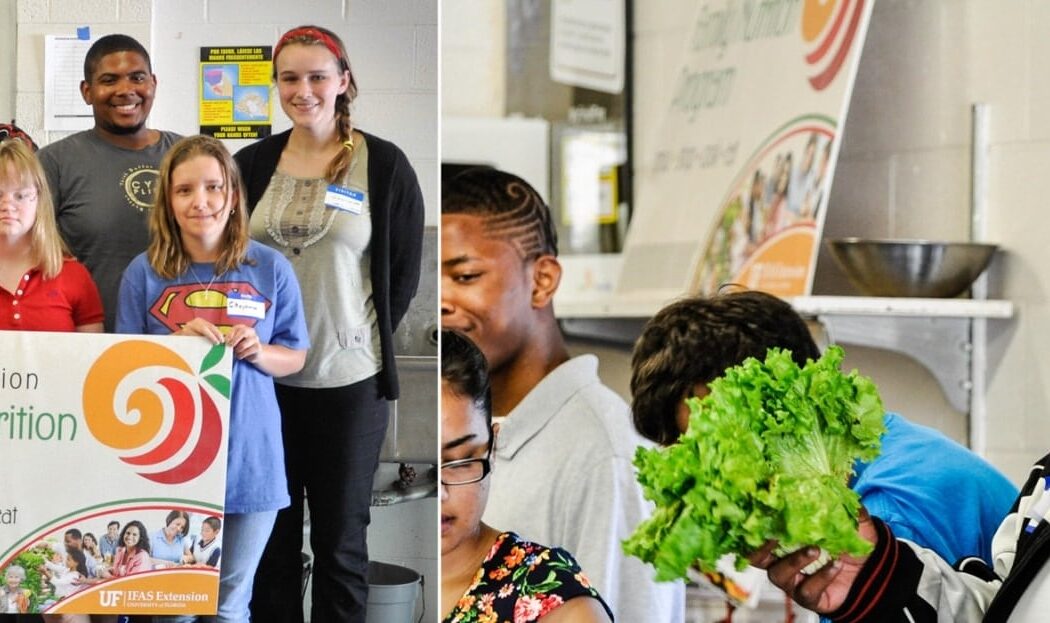Learn about UF, IFAS Extension Office’s local resources, including their comprehensive Family Nutrition Program in this Edscoop Spotlight!
Q: What does your job entail?
I am a Food Systems Specialist with the University of Florida, Institute of Food and Agricultural Sciences, Extension Family Nutrition Program (FNP). FNP teaches people how to eat healthy on a budget as well as how to become more physically active in order to reduce the risk of obesity and chronic disease. We offer free nutrition education in schools, child care centers, and in communities. We also work to improve access to healthy foods and change the environment in which adults and children make choices about food and fitness. Our free programs are offered in 40 Florida counties, including Leon County. My job primarily entails working with key organizations throughout the local food system – such as schools, community centers, farmers markets, non-profits, and more – to identify their health and wellness goals. I provide additional research-based information, resources, and the supplies needed to help support them in this process. The result, I hope, is a happier, healthier Florida for all!
Q: What are some of the biggest challenges that you see schools and families facing when it comes to nutrition?
When most people think of poor health and nutrition, they think of access. Limited access to fresh, healthy food is only half of the problem when tackling issues of public health. Not only must schools and families have access to nutrient-dense foods, but they also need to know what to do with those foods. Education can go a long way in helping families make the most of their meals. By providing educational classes on nutrition, food safety, cooking, and even gardening, schools and families can become more resilient and more prepared amongst a rapidly changing food system. Check out our websites to find a free class near you: UF/IFAS Extension at Leon County: http://sfyl.ifas.ufl.edu/leon/; Family Nutrition Program www.uffnp.org.
Q: What are the biggest benefits to starting and maintaining a school garden?
School gardens engage students in experiential, hands-on learning outside of the traditional classroom setting. Students involved in school gardens grow not only fruits and vegetables, but also a variety of useful life skills, such as, environmental stewardship, community and social development, a healthy lifestyle, and academic achievement. In fact, research shows that “When schools offer school gardens, 44.2% of students eat more fruits and vegetables.” (Pew Charitable Trusts and Robert Wood Johnson Foundation. School Meal Programs Innovate to Improve Student Nutrition. 2016.) More broadly, school gardens are a component of a larger movement called Farm to School, which enriches the connection communities have with fresh, healthy food and producers by changing food purchasing and education practices at schools. Farm to School and school gardens work hand-in-hand to cultivate a new generation of students who know what healthy food is, care where their food comes from, and eat nutritious food every day.
Q: Do you have any tips for families that want to start home gardens?
A home garden is a great way for families to learn together about the benefits of eating fresh, whole fruits and vegetables. Start small, with one or two raised beds, or even a container garden if you are living in an apartment setting with limited outdoor space. (You can always add more later!) Choose your location wisely : your garden plot should be located close to a water source in an area that receives at least six hours of direct sunlight daily. Plan your garden: before planting, take time to map out what fruits, vegetables, and herbs you would like to grow. Note that some plants can grow close together, while others need extensive room to spread. Finally, select a reliable source of organic matter for your garden… trust me, it matters! “Most Florida soils are low in organic matter and therefore benefit from the addition of organic matter such as animal manure, rotted leaves, compost, commercial soil mixes, and/or cover crops.” My go-to source of organic matter is mushroom compost, which is abundant here in North Florida where there are multiple local mushroom farms. For more tips and tricks like this, consult the Florida Vegetable Gardening Guide.
Q: What are other ways that educators can teach the value of nutrition in their classrooms?
In order to make nutrition education come to life in the classroom, educators must first realize that students who are well-nourished really do learn better. However, students make their own food choices every day – at home, at restaurants, and especially at school. Thus, educators must move beyond merely teaching about the food groups, and instead teach nutrition in a comprehensive, behavior-oriented manner. The messages students receive about nutrition should be “clear, consistent, and constant”. (Connie Liakos Evers. How to Teach Nutrition to Kids. 2012.) In doing so, we begin to create a healthy school food culture which reinforces students’ eating and physical activity habits. It’s a long road – but it starts in the classroom with simple activities integrated into everyday curriculum. Activities such as taste tests – where students sample a new fruit or vegetable grown in the school garden, and are then encouraged to describe the tasting experience using positive, descriptive language – help grow a healthy food culture in the school environment while reinforcing nutrition facts learned in the classroom. For more information on fun nutrition education curriculum, or if you’d like to get involved in school or community gardening in Leon County, please feel free to contact me directly!
Tiffany Torres
District Food Systems Specialist
UF/IFAS Extension Family Nutrition Program
Cell: (904) 207-1626 | Tiffany.Torres@ufl.edu

